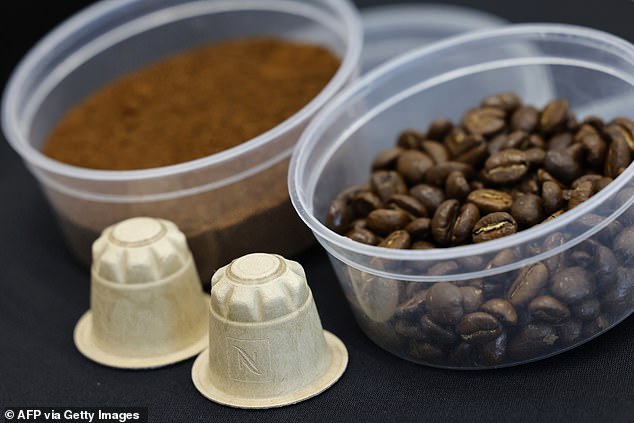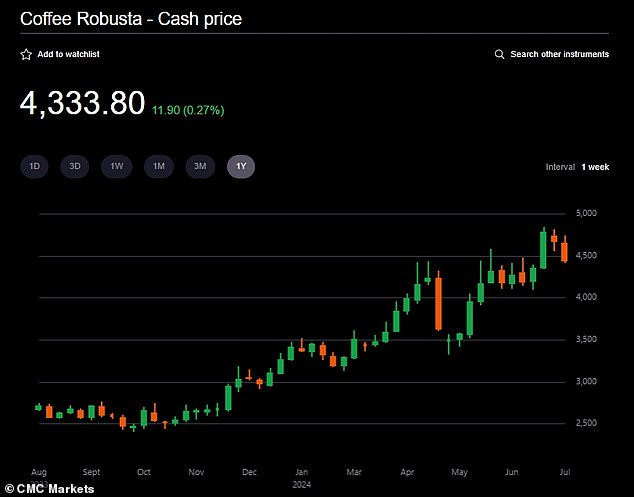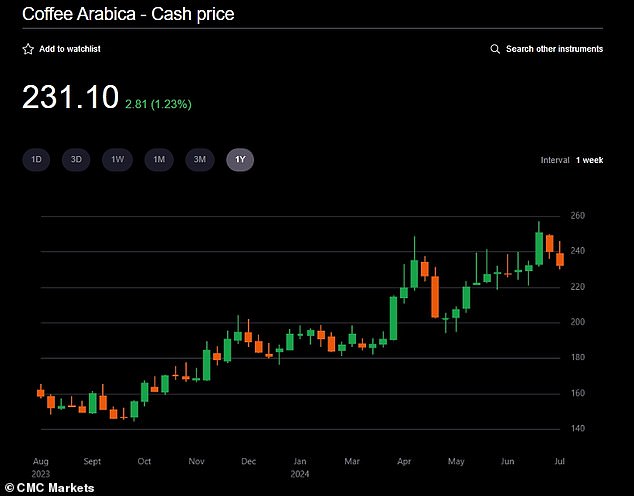Table of Contents
An impending change to coffee giant Pret a Manger’s popular loyalty programme was met with a mix of devastation and fury from some subscribers last month.
Subscribers, who were entitled to order up to five free Pret coffees a day and 20 per cent off food for £30 a month, will be offered just five half-price coffees a day for a monthly fee of £10 from September.
While some might still consider the new offer generous, high coffee bean prices since the start of the year could force Pret and its competitors to raise prices at the counter.
Change: From September, Pret a Manger coffee subscription plan users will no longer be entitled to claim up to five free coffees per day for £30 per month.
Prices for Robusta and Arabica beans, which together account for around 99 percent of global coffee production, have boomed.
London robusta futures hit a high of $4,846.70 a tonne in July, a staggering 81.7 percent rise from a low of $2,652.60 12 months ago, according to online trading platform CMC Markets.
Over the same period, lower-caffeine arabica futures rose 42 percent to $2.32 a pound, after trading as low as $2.57 last month.
This compares with an all-time high of $3.02 (or $31.73 adjusted for inflation) in March 1977, when global production failed to meet demand after a particularly poor Brazilian harvest.
Coffee sellers, including pubs, cafes and supermarkets, subsequently had to raise prices to protect their profit margins.
The prices will not have gone unnoticed by UK consumers, where the British Coffee Association estimates that Around 98 million cups of coffee are drunk every day.
So why have coffee prices skyrocketed and is there any chance they will fall in the near future?
Why have coffee prices risen so much lately?
After rising in 2021 before retreating the following year, coffee prices have grown steadily since November 2023 as climate change has affected production in some major coffee-producing countries.
Brazil, the world’s largest coffee producer and exporter, has experienced drier weather and above-average temperatures in regions such as Minas Gerais.
As a result, exporter group Cecafe warned that this season’s robusta crop levels could be 10 percent lower than forecast, while arabica production could be 5 percent lower.
Meanwhile, extreme heat and the country’s worst drought in nearly a decade have damaged robusta yields across Vietnam’s Central Highlands region, home to most of the country’s coffee plantations.
Vietnam’s Ministry of Agriculture and Rural Development now expects total coffee crop output between October 2023 and September 2024 to fall by about one-fifth year-on-year.

A more expensive cup: Coffee prices have risen steadily since November 2023 as climate change has affected production in some major coffee-producing nations.
And for next year, coffee trader Volcafe believes Vietnam will only be able to deliver 24 million bags of robusta coffee, the lowest level in 13 years, due to “irreversible damage” suffered by the country’s coffee flowers.
Coffee production is vulnerable to dramatic climate changes, particularly very hot and rainy conditions that allow pests and diseases to spread more easily.
It is most abundant when temperatures are neither too hot nor too cold and conditions are neither too humid nor too dry, leading some scientists to nickname coffee “the Goldilocks plant.”
Farmers could move their crops from tropical environments to more northern areas, but this poses its own economic and ecological problems.
New EU regulations banning imports of coffee grown on recently deforested land will come into force from the end of 2024.
Roasters operating across the bloc will be required to provide geolocation data showing the precise origin of the coffee beans they source or risk fines amounting to up to 4 percent of their EU turnover.
The proposed laws have been heavily criticised by Giuseppe Lavazza, chairman of the Italian coffee products manufacturer of the same name.
He told the Telegraph that the move would be… Making coffee more expensive across Europebecause many farmers in developing countries will not be able to comply with the additional bureaucracy and will be forced out of business.
“Many farmers do not know the boundaries of their farm, they have no way of entering the satellite’s geographic coordinates into the system,” Lavazza explained, adding that some “simply pick coffee, fantastic coffee, the best in the world, in wild forests.”
The EU has said the value of coffee grown in wild forests is minimal and that free coordinate mapping technology is easy to obtain.
Carlos Mera, head of agricultural commodities markets at Rabobank, says this has created “a lot of uncertainty” and led many traders to “bring forward purchases and imports ahead of the deadline.”
“That’s why we see elevated prices in the coming months, but weakening closer to or after implementation,” he adds, although he believes crop problems in Brazil and Vietnam are the main reason why prices are so high.
Another factor behind current coffee prices is the substantial reduction in ships passing through the Suez Canal due to threats of attacks by the Houthis, a militant group that controls much of Yemen.
Some of the world’s largest shipping groups, including Maersk, Hapag-Lloyd, CMA CGM and Mediterranean Shipping Company, are diverting cargo to go around the Cape of Good Hope in southern Africa.
These trips add at least ten extra days to the journeys of ships transporting robusta coffee from Vietnam or Indonesia to Europe, which in turn causes costs to skyrocket.

Forecast increase: The World Bank predicted in April that average robusta coffee prices will rise by a quarter to $3.50 per kilo this year.
Average global container rates have soared over the past year, from $1,537 per 40-foot container to $5,806, according to Drewry’s Global Container Index.
Transporting goods from Shanghai to Rotterdam has become particularly expensive: freight prices for this route have soared by 539 percent to $8,260.
Unless Houthi attacks stop soon, cafe owners may have to pass on an even larger share of the extra costs they incur to consumers.
How much higher will coffee prices go?
The World Bank predicted in April that Average Robusta coffee prices will rise by a quarter at $3.50 per kilo this year before falling back to $2.80 in 2025.
However, the report forecasts arabica prices to fall to $4.40 in 2024, followed by $4.35 next year, helped by production in Brazil, Colombia and Ethiopia, increasing total supply by nearly 7 million bags in the current season.
Similarly, Rabobank believes that Arabica prices, while remaining above $2 per pound, will begin to fall towards December and into 2025.
One factor that Rabobank’s Carlos Mera believes is not significantly affecting prices is demand, which he says has risen less than 1 percent in the past year instead of the usual 2 to 2.5 percent.
He says: ‘Demand is expected to weaken and production to recover as a result of the current cycle of high prices.’

Coffee prices have skyrocketed over the past year
The popularity of coffee consumption is expected to continue to increase in the coming years as a result of demographic change, with a rapidly expanding middle class in countries such as China, India and some African nations.
The US Department of Agriculture estimates that global coffee production will increase by 7 million bags to 176.2 million in 2024/25, while consumption will total 170.6 million.
In the long term, however, coffee producers will be forced to respond to the threat of climate change.
Otherwise, Pret’s future coffee subscription offers could be even less generous.

Coffee prices have skyrocketed over the past year
DIY INVESTMENT PLATFORMS

AJ Bell

AJ Bell
Easy investment and ready-to-use portfolios

Hargreaves Lansdown

Hargreaves Lansdown
Free investment ideas and fund trading

interactive investor

interactive investor
Flat rate investing from £4.99 per month

Saxo

Saxo
Get £200 back in trading commissions

Trade 212

Trade 212
Free treatment and no commissions per account
Affiliate links: If you purchase a product This is Money may earn a commission. These offers are chosen by our editorial team as we believe they are worth highlighting. This does not affect our editorial independence.
Some links in this article may be affiliate links. If you click on them we may earn a small commission. This helps us fund This Is Money and keep it free to use. We do not write articles to promote products. We do not allow any commercial relationships to affect our editorial independence.


